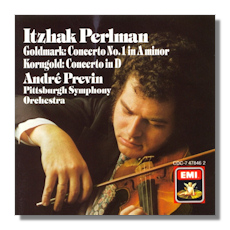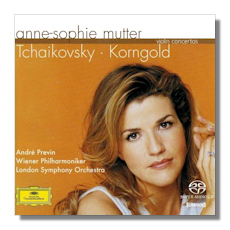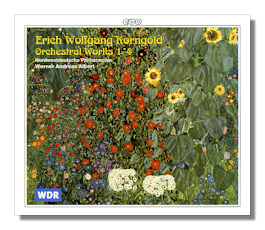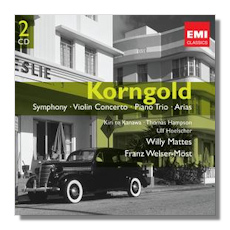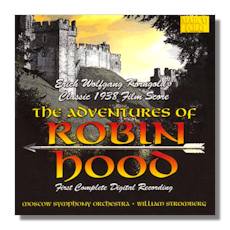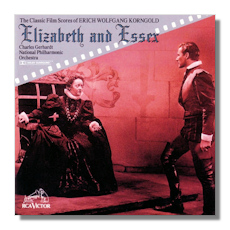
The Internet's Premier Classical Music Source
Related Links
-
Find CDs & Downloads
Amazon - UK - Germany - Canada - France - Japan
ArkivMusic - CD Universe
Find DVDs & Blu-ray
Amazon - UK - Germany - Canada - France - Japan
ArkivMusic-Video Universe
Find Scores & Sheet Music
Sheet Music Plus -
Recommended Links
Site News
Erich Wolfgang Korngold
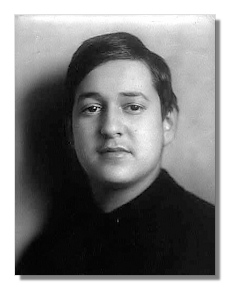
(1897 - 1957)
It's difficult to compare prodigies from different eras, mainly because music changes so much. From Mozart's time to our own, just the means of music have become more complicated. The composer must consider more possibilities than his ancestors. My own rule is that a prodigy must compose at least at the level of the adults of his time. This holds true certainly for Wolfgang Mozart, Felix Mendelssohn, and Erich Wolfgang Korngold (May 29, 1897 - November 29, 1957).
Korngold was the second son of the eminent Viennese music critic Julius Korngold a champion of Gustav Mahler and Richard Strauss, among others. The boy's earliest music showed a mastery of form and harmony so impressive that it impressed Strauss, Jean Sibelius, Karl Goldmark, Giacomo Puccini, Artur Nikisch, Bruno Walter, and Artur Schnabel, who took Korngold's Piano Sonata in E-flat into his repertory. Some Viennese wags remarked that when Richard Strauss looked over his shoulder, he saw little Erich gaining on him. Others responded with skepticism, asserting that Julius, not Erich, was the real composer. Julius replied, "If I could write like that, do you think I would stay a music critic?"
Unfortunately, all this emphasizes Korngold's youth, rather than the pieces he actually wrote. In general, they are Straussian in procedure, but with a lyricism all the composer's own and a beauty, even "prettiness," of orchestration not found in Strauss. His Schauspiel Ouvertüre ("theater overture", 1911) and Sinfonietta (1912) are well-made and tuneful, if deliberately small-scale. However, at 17 he branched into opera with Der Ring des Polykrates and Violanta, the latter of which still gets revived occasionally. His Opera, Die tote Stadt (1920), brought his European career to its height and seems to still merit consideration as among his finest work. Das Wunder der Heliane (the miracle of Heliane, 1927) Korngold considered his best opera. I've heard it. He was wrong.
During the Twenties, Korngold taught as a professor of opera and composition at the Vienna State Academy and also worked on theater productions with Max Reinhardt. In 1934, Reinhardt invited him to Hollywood to work on the music for his film of A Midsummer Night's Dream. With the political situation in Europe deteriorating into Fascism, Korngold stayed in Hollywood, getting his family, including his father, out of Austria. In Hollywood, Korngold – although not the inventor of the style – brought late Romantic symphonic film scoring to its height in such classics as Captain Blood, The Adventures of Robin Hood, The Prince and the Pauper, The Sea Hawk, The Private Lives of Elizabeth and Essex, King's Row, The Sea Wolf, Of Human Bondage, and Deception. Many film composers at the time lacked his classical chops and had come up as theater organists and conductors. They all learned from him. Korngold treated movies as he treated opera, reasonably enough. Many consider him the finest film scorer of all time. He has had enormous influence on successive generations. Next time you watch Star Wars or Superman, listen for John Williams's many tips of the hat to Korngold.
However, Korngold wasn't writing just film scores. His final opera Die Kathrin, based on The Taming of the Shrew, was denied European performance, due to the Anschluss. His gorgeous violin concerto (1937, rev. 1945) for Heifetz remains in the standard repertory. His Cello Concerto (1946), based on the Deception score, is too short to ever become standard, but it's a concentrated, powerful work.
In 1946, Korngold gave up regular movie work to concentrate on concert pieces. However, Europe now considered him old hat, as "serious" American composers already had. They held his film work against him as well as the money he made from it, forgetting why he had become such a star in the first place. I find his last period his best, with the Symphonic Serenade (1947) and the Symphony in f# (1947-52). In both, one finds the gorgeous orchestration and the post-Straussian architecture, but a new openness to more modern harmony as well. Despite the attempts of musical Puritans to burn him at the stake, the music is simply too beautiful to be forgotten. ~ Steve Schwartz

Recommended Recordings
 Concertos
Concertos
- Violin Concerto in D Major, Op. 35 w/ Goldmark & Sinding/EMI CDC7478462
-
Itzhak Perlman (violin), André Previn/Pittsburgh Symphony Orchestra
Amazon - UK - Germany - Canada - France - Japan - ArkivMusic
Or reissued on Great Recordings of the Century 509677-2
Amazon - UK - Germany - Canada - France - Japan - CD Universe - JPC
- Violin Concerto in D Major, Op. 35 w/ Tchaikovsky/Deutsche Grammophon 474874-2
-
Anne-Sophie Mutter (violin), André Previn /London Symphony Orchestra
Amazon - UK - Germany - Canada - France - Japan - ArkivMusic - CD Universe - JPC
Or available on CD 474515-2:
Amazon - UK - Germany - Canada - France - Japan - ArkivMusic - CD Universe - JPC
- Violin Concerto in D Major, Op. 35 w/ Barber/Deutsche Grammophon 439886-2
-
Gil Shaham (violin), André Previn/London Symphony Orchestra
- Cello Concerto in C Major, Op. 37; Piano Concerto for the Left Hand in C Sharp Major, Op. 17, Symphonic Serenade, Military March/Chandos CHAN9508
-
Peter Dixon (cello), Howard Shelley (piano), Matthias Bamert/BBC Philharmonic Orchestra
- Piano Concerto for the Left Hand in C Sharp Major, Op. 17 with Marx/Hyperion CDA66990
-
Marc-André Hamelin (piano), Osmo Vänskä/BBC Scottish Symphony Orchestra
 Orchestral Music
Orchestral Music
- Der Schneemann, Schauspiel-Ouvertüre, Sinfonietta, Viel Larm um Nichts, Symphonic Overture "Sursum corda", Piano Concerto, Cello Concerto, Baby Serenade, Symphonic Serenade, Symphony, Theme & Variations, Straussiana/CPO 999150-2
-
Julius Berger (cello), Steven de Groote (piano), Christian Brüning (violin), Northwest German Philharmonic Orchestra/Werner Andreas Albert
- Symphony in F Sharp Major, Op. 40, Suite "Much Ado about Nothing", Op. 11/Deutsche Grammophon 453436-2
-
André Previn/London Symphony Orchestra
- Symphony in F Sharp Major, Op. 40*; Suite "Much Ado about Nothing", Op. 11; Violin Concerto, Op. 35; Piano Trio, Die tote Stadt arias/EMI Gemini 09992-17650-2
-
Ulf Hoelscher (violin), Willy Mattes/Stuttgart Radio Symphony Orchestra; *Franz Welser-Möst/Philadelphia Orchestra
Film Scores
- The Adventures of Robin Hood/Marco Polo 8.225268
-
William T. Stromberg/Moscow Symphony Orchestra
- The Sea Hawk; Deception/Naxos 8.570110-11
-
Alexander Zagorinsky (cello), Irina Romishevskaya (soprano), William T. Stromberg/Moscow Symphony Orchestra
- The Sea Hawk, Of Human Bondage, Between Two Worlds, Sea Wolf, Constant Nymph, King's Row, Anthony Adverse, Deception, Devotion, Escape Me Never/RCA Victor Gold Seal 7890-2-RC
-
Charles Gerhardt/National Philharmonic Orchestra
- The Private Lives of Elizabeth and Essex, The Prince and the Pauper, Anthony Adverse, The Sea Wolf, Deception, Another Dawn, Of Human Bondage/RCA Victor 0185-2-RG
-
Charles Gerhardt/National Philharmonic Orchestra
- The Sea Hawk, The Private Lives of Elizabeth and Essex, Captain Blood, The Prince and the Pauper/Deutsche Grammophon 471347-2
-
André Previn/London Symphony Orchestra














